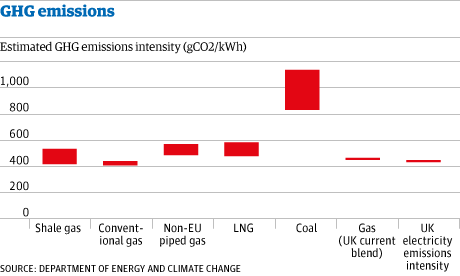If you have been following fracking in the news and through on-line media, you will have noticed that there is great disparity and confusion surrounding the potential impacts of shale-gas on carbon emissions. There are polar opinions on the subject...and what makes it more complicated is that its not only the combustion of the shale gas, its also the fugitive emissions of methane- which has a net greenhouse effect 25 times greater than carbon dioxide. Phew..But don't worry, I've tried to clear up some of the confusion!
In the opening pages McKay states that the carbon footprint of shale gas, from both extraction and usage, is estimated to be in the range of 200-253g of carbon dioxide emissions per kilowatt hour of chemical energy. This makes shale gas comparable to that of Conventional Gas which is 199-207g CO2e /kWh and less than the UK's imported Liquefied Natural Gas, which lies in the range of 233-270g CO2e/kWh and typically comes from Qatar. This means that fracking should have no detrimental impact on the UK's current legally binding climate targets.
Furthermore, McKay also highlights that shale gas has a significantly lower carbon footprint than Coal, when used for electricity generation; this is what is often described as the 'transition from dirty Coal to clean Gas' in the media. The figures (relating to electricity generation) speak for themselves: Shale-Gas has a range of 423-535g CO2e/kWh, almost half of the amount allocated to coal (837-1130g CO2e/kWh).Check out the report for some easy -to -read graphs that show this clearly. Below is a summary graph, taken from an article in the Guardian, available at : (http://www.theguardian.com/environment/2013/sep/09/fracking-shale-gas-ed-davey-climate-change/print).
Image URL: (http://static.guim.co.uk/sysimages/Guardian/Pix/pictures/2013/9/9/1378736805327/GHG_EMISSIONS_WEB.png)
Regarding the issue of fugitive emissions during extraction, McKay describes that with the correct management and monitoring, this can be largely mitigated and kept at low levels. This assumption is based only upon engineering calculations and, unbelievably, there has been no published study of that has measured fugitive emissions. However, as McKay points out, currently there is little knowledge of the greenhouse emissions that are associated with shale-gas exploration, pre-production, production, processing and post-production; at some point these figures must be incorporated into the carbon budget.
In a speech at The Royal Society, Ed Davey, the Secretary of State for Energy and Climate Change, is quoted as saying:
"Gas, as the cleanest fossil fuel, is part of the answer to climate
change, as a bridge in our transition to a green future, especially in
our move away from coal, with the right safeguards in place the
net effect on national emission from UK shale gas production will be
relatively small when compared to the use of other sources of gas."
But even with the dodgy-sounding title of 'a slightly higher carbon-footprint than conventional gas,' fracking is still contributing to a high-carbon future for the UK. Does it really make sense to exploit another innately limited fossil fuel resource? Should the focus be shifted onto low-carbon renewable energy projects? Will fracking even be a viable option if the UK enters in an international agreement on a UN climate deal, scheduled to take place in Paris, 2015?

No comments:
Post a Comment